
The American Academy of Implant Dentistry (AAID) has filed a federal lawsuit challenging the constitutionality of regulations by the Texas State Board of Dental Examiners that limit dentists from advertising themselves as "specialists." The AAID, which has won similar suits against California and Florida, says the rule violates free speech, equal protection, and due process rights.
The 22-page complaint was filed March 5 in the U.S. District Court for the Western District of Texas, Austin Division against the dental board. The AAID was joined in the suit by three other organizations: the American Society of Dentist Anesthesiologists (ASDA), the American Academy of Oral Medicine (AAOM), and the American Academy of Orofacial Pain (AAOP).
The complaint states that the rule unfairly gives sole authority to designate specialty status to a private trade association, the ADA, over which the Texas dental board has no control. Specialty recognition is determined by the ADA through a "political process carried out by competitor dentists, with no opportunity for review or appeal by any licensed dentist in Texas," according to the suit.
“A state cannot simply point to a private trade association with respect to what a licensed dentist can or cannot say to the public.”
The ADA declined to comment on the case. Sarah Carnes-Lemp, attorney for the Texas State Board of Dental Examiners, told DrBicuspid.com that the board is reviewing the suit and has contacted the state attorney general. The board's rule took effect in May 2013.
Currently, the ADA officially recognizes only nine dental specialties: endodontics, oral and maxillofacial surgery, orthodontics and dentofacial orthopedics, pediatric dentistry, periodontics, prosthodontics, dental public health, oral and maxillofacial pathology, and oral and maxillofacial radiology.
"The regulatory scheme has effectively granted the ADA the power to regulate the right to free speech of the individual plaintiffs by not allowing credentialed members in the AAID, ASDA, AAOM, or AAOP to advertise as specialists even though they are highly qualified to do so," the suit states. "It creates false impressions regarding the legitimate credentialing organizations of which the individual plaintiffs are members and signals a state-approved stamp of unworthiness of specialty status."
The AAID filed a similar challenge to the Texas prohibition in 2012, but it was resolved when the dental board agreed to amend its regulations, said AAID attorney Frank Recker, DDS. This suit seeks a federal ruling that makes it is unconstitutional for state dental boards to defer "specialty" status to private trade associations.
Dr. Recker noted that the same issue was decided by a Florida state court in 2009, which ruled that even the state Legislature cannot delegate commercial free speech rights to private trade associations.
"Private trade associations, such as the ADA, can make all the rules it wants that relate to its membership, membership criteria, ethical provisions, or what it classifies as 'specialties,' " Dr. Recker told DrBicuspid.com. "But a state cannot simply point to a private trade association with respect to what a licensed dentist can or cannot say to the public in that state."
Dr. Recker acknowledged that many state dental boards defer to the ADA's Commission on Dental Accreditation (CODA) for specialty designations, but he noted that CODA is controlled by the ADA and CODA bylaws reference the ADA as the entity that determines "specialties."
The American Medical Association formerly determined medical specialties, but that ended with the formation of the American Board of Medical Specialties, which all states now rely on for specialty designations.
The suit states dentists in the plaintiff groups have spent significant amounts of time and money to earn credentials and acquire expertise in their respective areas of practice, but they must compete with ADA members who have not earned "bona fide" credentials in those fields.
"The specialty regulation implies that the ADA has evaluated the authenticity of the organizational plaintiffs and determined that they are unfit for inclusion as specialty boards and their respective fields are unworthy of advertising as specialty areas of practice," the suit states.



















